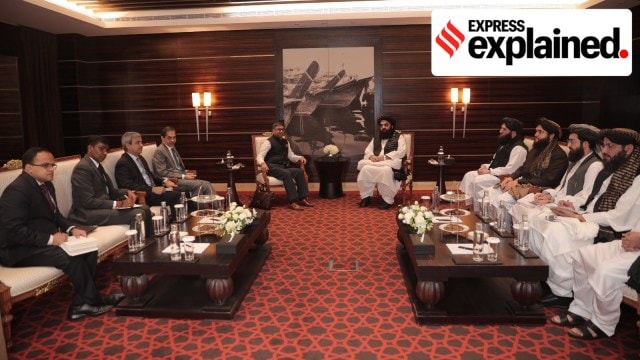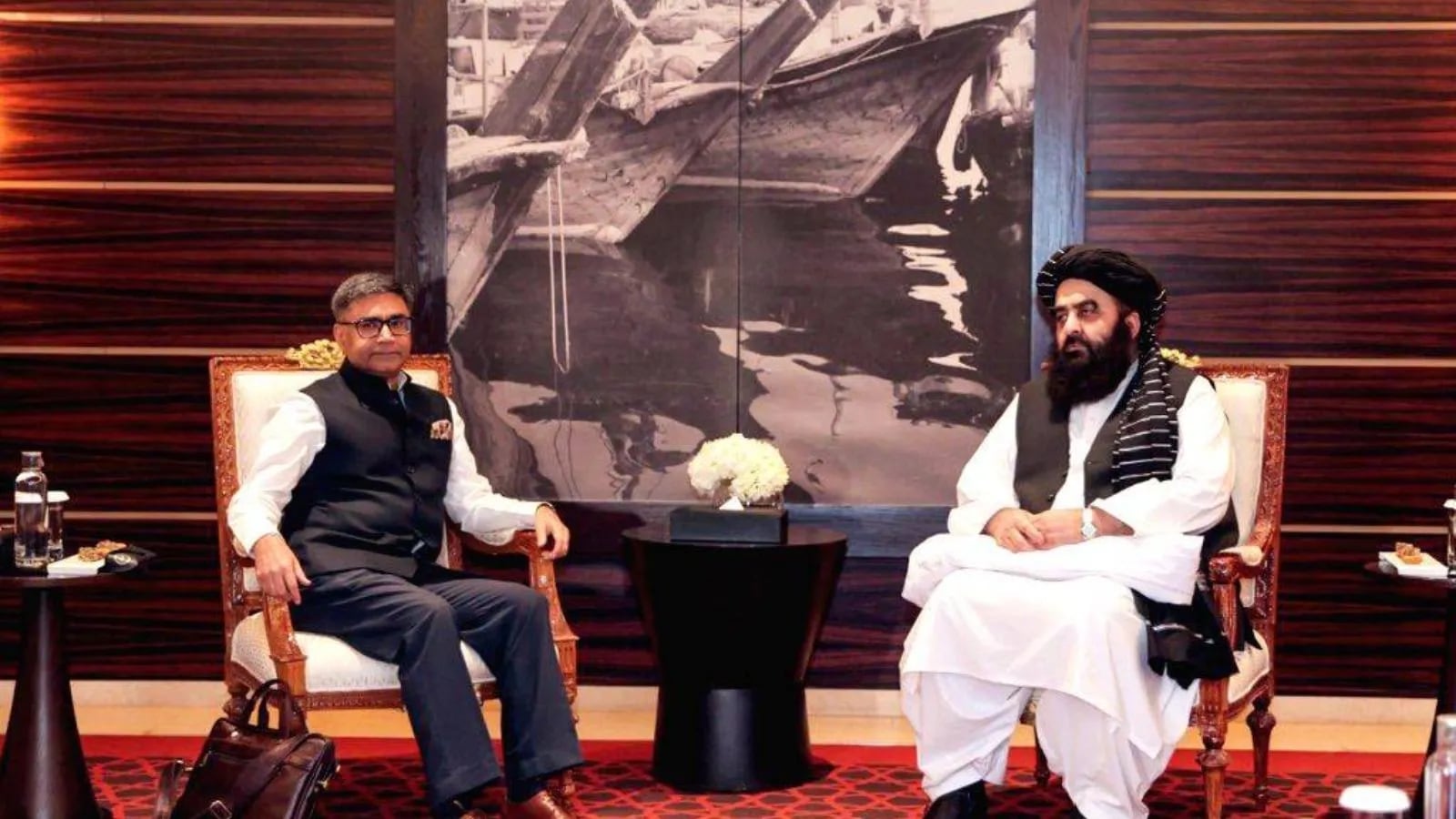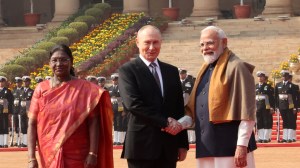While there is no move yet to grant official recognition to the Taliban government, this is an effort by India to secure its own national and security interests with many moving parts in play.

Five key factors were behind India’s move to engage at a higher level: Taliban’s benefactor and ally Pakistan has become an adversary; Iran has been weakened considerably; Russia is fighting its own war; and the US, and the world, are preparing for the return of Donald Trump to the White House. Most importantly, China is making inroads in Afghanistan by exchanging ambassadors with the Taliban.
India, which has been watching the state of play, quickly came to the conclusion that this was the right time to upgrade the level of official engagement without giving official recognition – or lose out on years of investment in Afghanistan.
Security is the most important and core concern of India – no anti-Indian terrorist group should be allowed to operate in Afghanistan’s territory.
 India’s foreign Secy Vikram Misri meets Acting Afghan FM Mawlawi Amir Khan Muttaqi in Dubai today. (X)
India’s foreign Secy Vikram Misri meets Acting Afghan FM Mawlawi Amir Khan Muttaqi in Dubai today. (X)
The Taliban had been calling for a more active engagement with India ever since they ousted the Ashraf Ghani government and seized control of Kabul in the middle of August 2021. Days later, US troops made a chaotic exit from Afghanistan.
India made its first move on August 31, 2021, itself, when its ambassador in Qatar, Deepak Mittal, met Taliban’s Doha office representatives, led by Sher Mohammad Abbas Stanikzai (an Indian Military Academy cadet who later became the Taliban’s Deputy Foreign Minister).
Story continues below this ad
Subsequently, Indian officials kept up the engagement, starting with J P Singh, Joint Secretary (Pakistan, Afghanistan and Iran) in the Ministry of External Affairs, meeting key Taliban leaders in June 2022. That paved the way for sending a technical team at the Indian embassy in Kabul days later.
Singh and other officials have had at least four meetings that were announced subsequently, before the Foreign Secretary’s meeting was arranged in Dubai.
What started as a limited engagement and was kept low key – through the technical team of officials in Kabul meeting Taliban ministers and officials – made it easier, when the circumstances started changing in the last year or so.
In the later half of 2024, Iran, which shares India’s concerns about Taliban on women’s and minority rights, suffered a humiliating blow as Israel managed to decimate Hezbollah and Hamas, two among Tehran’s proxies. More so, Israel also launched direct missile attacks on Iran, the first since the Iranian revolution of 1979.
Story continues below this ad
Tehran was now too preoccupied with re-establishing deterrence over Israel and putting its house in order, than thinking about Taliban in neighbouring Afghanistan. As a senior Iranian official said last week in Delhi that although the Taliban’s treatment of women is “horrendous”, the Taliban regime is a “reality”. So, Iran was no longer breathing down the Taliban neck.
The second factor: In the last three years, Russia has been caught up with its war in Ukraine, and has been trying to build bridges with the Taliban. President Vladimir Putin said in July 2024 that Taliban was now an ally in fighting terrorism.
Moscow sees a major security threat from Islamic groups based in countries from Afghanistan to the Middle East. And it lost a major ally in December when Syrian President Bashar al-Assad’s regime fell.
In December 2024, the Russian parliament voted in favour of a law that would make it possible to remove the Taliban from Moscow’s list of banned terrorist organisations.
Story continues below this ad
Third, China also got into the great game in Afghanistan as it started building bridges and eyeing natural resources. In September 2023, China sent its ambassador to Kabul and in early 2024, Beijing received a Taliban representative as its ambassador.
China has called for the lifting of a freeze on overseas assets of the Afghan central bank. Delhi believes that Beijing may be eyeing the development of Afghanistan’s natural resources as part of its Belt and Road initiative.
In Kabul, a large-scale urban development project to build homes and parks is going on with China’s support. At a ceremony, a Taliban minister praised China’s stance, saying, “We tried to approach former support countries, but China was the only one that helped us.”
Delhi saw Beijing filling the vacuum left behind by the US, Europe, the West and India.
Story continues below this ad
Fourth, Pakistan, which celebrated the rise of the Taliban with then ISI chief Lt Gen Faiz Hameed sipping tea at Kabul’s Serena hotel in 2021, is now in a fraught relationship with the Taliban. India, at that time, was wary of how the Taliban would give space to Pakistan’s ISI and use Afghan soil against India and Indian interests.
But the tension between Taliban and Pakistan have come to a stage where Kabul has claimed that Pakistani airstrikes in Afghanistan’s Paktika province on December 24 resulted in the death of at least 51 people, including women and children.
Two days ago, on January 6, India made its first statement on the Pakistani airstrikes. “We have noted the media reports on airstrikes on Afghan civilians, including women and children, in which several precious lives have been lost. We unequivocally condemn any attack on innocent civilians. It is an old practice of Pakistan to blame its neighbours for its own internal failures,” the MEA said.
Hastening Delhi’s strategic imperative is the return of Donald Trump to the Oval Office on January 20, and after Biden’s chaotic troop withdrawal, there could be an engagement from the new American administration with the Taliban. After all, it was the Trump administration which had started talks with the Taliban and had come to a deal on US troop withdrawal. Biden implemented the deal agreed by the predecessor.
Story continues below this ad
So, the timing of the meeting in Dubai has been framed by these many moving parts that have defined the state of play — essentially putting Delhi at the centre of engagement with the Taliban.
India’s main concern in Afghanistan has been that terrorism should not flourish in Afghanistan, and by all estimates, the security situation has improved – although women’s rights have been crushed, much to Delhi’s discomfiture. The Taliban have so far ensured security guarantee for Indian interests and facilities, including the embassy premises. And they have said that they are fighting the Islamic State Khorasan Province which India is also wary of.
From the very first meeting with Indian officials, the Taliban have underlined that “India’s help is more than welcome, when it comes to humanitarian assistance and development projects”. In fact, at that 2021 meeting between Mittal and Stanikzai, Taliban officials had clearly said India’s projects – estimated to be of USD 3 billion in the last 20 years – have been “extremely productive” and they would like “India to stay invested in Afghanistan”.



 India’s foreign Secy Vikram Misri meets Acting Afghan FM Mawlawi Amir Khan Muttaqi in Dubai today. (X)
India’s foreign Secy Vikram Misri meets Acting Afghan FM Mawlawi Amir Khan Muttaqi in Dubai today. (X)




































